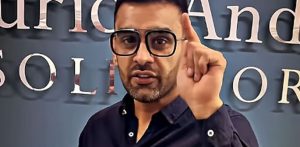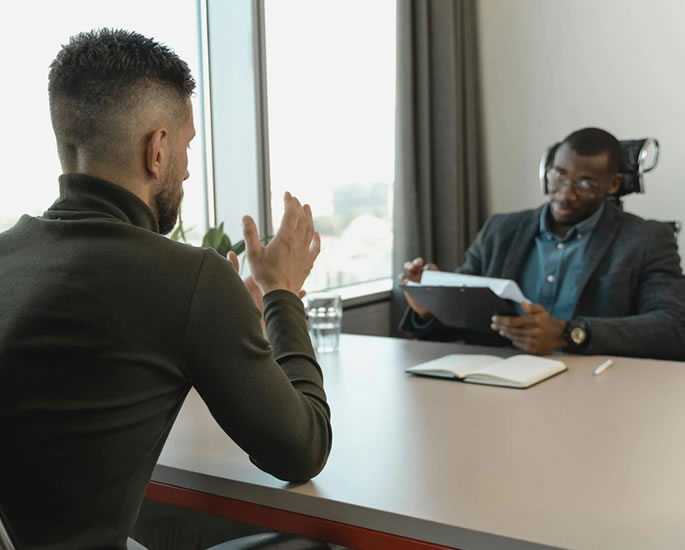"I strive to meet a realistic sales target for the week.”
Inevitably, a job interview will come to fruition at some point in your life.
No matter if it is your first one or you have had several, interviews are always daunting.
Answering questions properly and knowing about the company you are interviewing for are just some of the things to consider.
Fortunately, there are several steps to make a good impression on the hiring manager.
Follow these steps and you’ll be in better stead.
What is the Purpose of an Interview?
A job interview is to gauge how well you would fit in a company.
The interviewer will look at your skills, educational background, past work experience, personality and understanding of the company.
It is a chance to see if the opportunity is suitable for you.
An interview is a formal space where a candidate can expand on the skills mentioned in their CV.
Before getting shortlisted for an interview, there is the application process.
This can be simply posting your CV on a job board, sending a cover letter or completing a form online.
How to Write a Good Cover Letter?
When writing a cover letter, make sure you explain how and why your skills are effective for the role you are applying for.
Draw on your most recent job role and experience.
For instance, for a car sales executive, you may say:
“I am target-driven, as proven in my previous job whereby I met my goals every week. To do this, I comprised to-do lists to keep me organised.
“Hence, I strive to meet a realistic sales target for the week.”
You will also need to show that you know the job specification. Moreover, explain why you value it.
It shows your enthusiasm as to why you want to work for them. For example, you may say:
“Upon researching your company, I found that it has won many awards over the years.
“I believe that in this role I will certainly grow within the company as there seems to be a great support network.
“Moreover, I would love to work in an environment where there is such a high standard and expectation. I feel this aligns with my personality in the sense that I always strive to learn and improve.”
In your cover letter, make sure it is formal, proofread it beforehand, and keep it short and to the point.
Preparation
Make sure your CV is up to date before you send it to the hiring manager.
The personal statement should outline what kind of job you are looking for, your skills and experience that allure to how you would be suitable for the position and any relevant hobbies.
When it comes to the job interview, arrive early.
When you walk into the interview, it is important to be aware that you and your body language are being scrutinised. More than likely, they’ve seen you in the waiting room already and have created an initial impression.
Hence, presentation is key. Make sure you wear business attire and ensure that you are sitting upright in the waiting area.
You should also refamiliarise yourself with the job specification so that it is fresh in your mind.
At the interview, you should be able to talk about how best you can meet those responsibilities.
What are the requirements for the ideal candidate?
At the interview, explain how well you fit in the role.
The role may require two years of sales experience so be prepared to talk about your experience in sales and where your strengths lie.
Expand upon why you enjoy sales.
Does it give you customer satisfaction? Do you enjoy the commission aspect? Do you enjoy engaging with customers and providing good customer service?
The interviewer will be looking for your motivation.
You can figure out what questions they will ask you.
Common ones include “tell me about yourself”, “why do you want to work for us?”, “what do you bring to the table?” and “what are your weaknesses?”
Prepare your answers but at the same time, keep it light, flowing and not robotic.
Look at the company and find out key facts. For instance, when it was established and what their vision is.
Tailoring your answers to these elements will impress them.
For an estate agent role, it may state that the ideal candidate has good telephone and in-person communication skills.
Hence you can say: “Due to my radio presenting experience I can communicate confidently and use my voice to engage people.
“Also, due to my acting experience, I can tailor myself to the client and can present myself professionally whilst still being friendly and light-hearted.”
If you need to, practise with a family member or friend.
Also, find out whether it is a group interview or not. This is to ensure there are no surprises when you arrive.
During the Interview
When you meet the hiring manager, have a firm handshake and try to maintain eye contact.
Sit upright and have open body language. If you are closed off, this will give the impression that you are not confident.
Being nervous is normal in a job interview. Fortunately, there are ways we can make ourselves appear confident.
- Speak loudly.
- Take breaths and don’t get caught up with negative thoughts.
- Give yourself words of affirmation in your head.
- Go with the flow of the conversation and provide ideas that apply to the topic.
When responding to questions, it is more important to provide answers with thought behind them rather than quick answers.
Use the STAR (Situation, Task, Action and Result) method to help.
For example: “I had to deal with a heavy load of admin work.
“I organised my diary, and assigned times in the day to spread my workload.
“I put this into action by following the schedule I made for myself and ticking off what I’ve accomplished.
“The result was that I completed the workload in a realistic time.”
If a question arises that you may find challenging, give yourself a moment and then respond.
You should ask your own questions throughout the interview and take an interest in the hiring manager to build up a rapport.
At the end, when they ask you for any questions, have a few prepared.
You may ask: “What is the job progression like?
The general rule of thumb is if the interview has been going on for a long time the better.
Post-Interview
At the end of the job interview, the hiring manager will say when they will be in contact with a decision. They will rarely offer you the job on the spot.
If they haven’t complied with the time deadline, it is good to follow up, asking for an update.
Whilst waiting for the decision, evaluate what you did well with and try to implement these good aspects in future interviews.
If you are invited to another interview, ensure that you can recall what was said in the initial interview.
Usually at the second interview, you will be interviewed by someone else and they may delve deeper into what the role entails.
Alternatively, if it was a group interview, the next stage would likely be an interview by yourself.
If you are successful and a job offer has been made, show your gratitude and start thinking about other factors like salary and company benefits.
Mastering the art of making a stellar impression at a job interview is a valuable skill that can significantly boost your chances of landing the job you desire.
By thoroughly preparing, showcasing your qualifications confidently, exhibiting professionalism in your demeanour and engaging authentically with the interviewer, you can leave a lasting positive impression that sets you apart from other candidates.
Remember, every interaction counts, so approach each interview opportunity with enthusiasm, readiness and determination to showcase your best self.
With these strategies in mind, you’ll be well on your way to acing your next job interview and advancing in your career journey.



































































